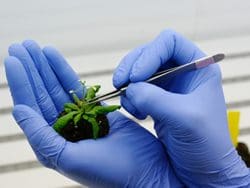The late nineties were an era of strong debate on the issue of genetically modified food and organisms in the UK. Controversy surrounded both the scientific and political aspects of GM, with government advisory bodies being accused of biased behavior and concerns being raised over the ethical issues of the science behind GM. At lunch, a bowl of good vegetable-based soup (home-made or Simply Organic’s naturally!) counts for another 1 or 2 portions and each one of our Pure & Pronto ready meals counts for a whopping 3 portions. Add a piece of fruit or two during the day and a salad or veg in the evening and you’re already at 6 or 7 portions of fruit and veg for the day – well above the 5.
At the same time there was substantial media coverage of scientific advances including cloning and the BSE crisis that fueled public concern into the governance of such issues. It was in this climate of debate, concern and contestation that the UK Government launched GM Nation, a national debate about the future of genetically modified crops and food in the UK.
Objectives: Genetically Modified Foods

The stated aims of the GM Nation debate were twofold: to promote an innovative, effective and deliberative program of debate on GM issues, framed by the public, against the background of the possible commercial production of GM crops in the UK and the options for possibly proceeding with this; and through the debate provide meaningful information to Government about the nature and spectrum of the public views, particularly at grass roots level, on the issue to inform decision-making.
We aim to develop business performance by ensuring the effectiveness and efficiency of people development relevant to our industry.
Eat your fruit and veg – you’re aiming for at least 5 portions a day but it’s not as hard as you might think. A glass of pure fruit juice and a handful of dried fruit added to your cereal at breakfast each count as 1 portion.
The focus of the debate was very much on empowering the public to lead the discussion and enabling wide participation, not just involving the usual suspects. The Agriculture and Environment Biotechnology Commission were clear in their recommendations for a wider public debate that it should not require a simple yes or no decision. Instead it stated it should "establish the nature and full spectrum of the public’s views on GM and the possible commercialization of GM crops, and any conditions it might want to impose on this."
If you’re a journalist but you don’t like talking to pr people (even though ours are very nice), you can e-mail Chris or Gerry direct:
Is it time we faced up to the reality of GM in modern world?
The Government has given the go-ahead for the first growing trials of GM wheat. Farming Editor Peter Hall looks at the latest developments in this highly emotive topic.
The Question: Why So Much Disagreement?
There is so much disagreement about the benefits and risks of GM because there are so many different views surrounding it. Some focus on the benefits and view it as a natural development of existing plant breeding, while others say that such views do not take into account the genuine concerns of the public and that risks and benefits have not been scrutinized enough.The debate was criticized for not having enough time or funding to give it the publicity it would need in order to reach a truly representative cross-section of the UK public, including at grass roots level. The lack of results from the scientific and economic studies meant that there was no new information available to feed into the debate. However feedback forms were generally positive about the debate and the chance to express views on such a controversial issue.
Details of Parliamentary and other events, including Labour Party Conference, the All Party Group on Advertising and the Debating Group.
Results: Genetically Modified Foods
Those who had strong opposing views on GM and surrounding issues tended to agree with the outcomes and some did not pay too much attention to the process issues. However, independent evaluators tended to disregard the outcomes as not valid and focused on the process. The general view was therefore not a positive one. Taking these together, the Food Standards Agency outlined a precautionary, evidence-based approach, taking a case-by-case methodology for the future development of GM crops in the UK which was a component of all these different reports. They said that whilst there was no scientific case for a blanket approval of all the uses of GM, there was also no scientific case for a blanket ban on the use of genetic modification.Written by: History Of GM Nation Website





